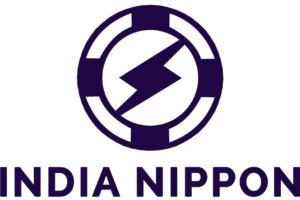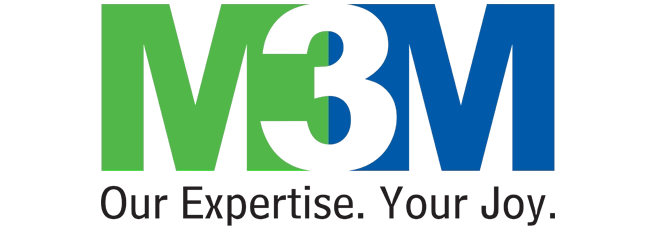Rutuparna Rout • January 29, 2026
20 must-have procurement skills for managers to succeed in 2026

Last update: February 11, 2026
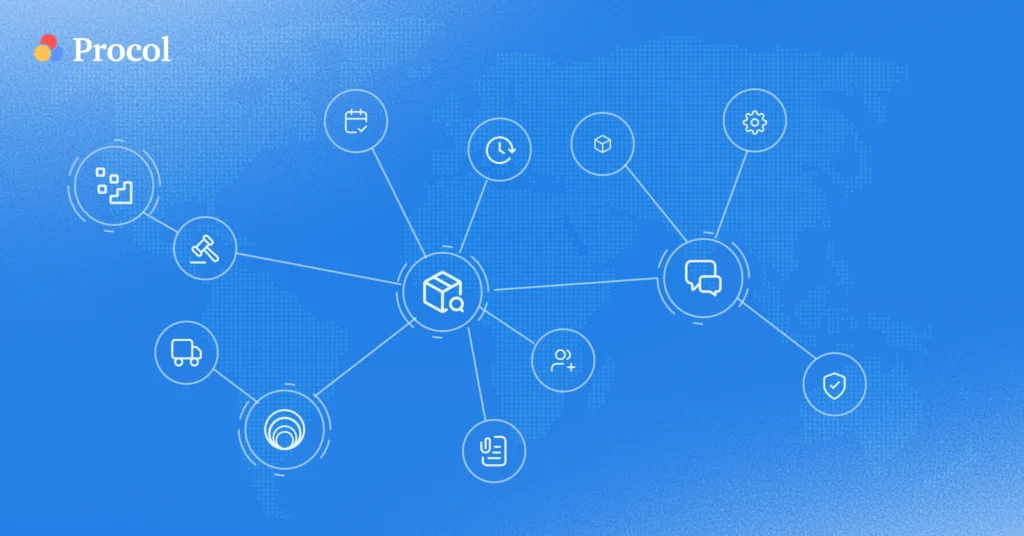
Procurement skills help a business grow. Strong skills don’t just look good on paper; when they’re put into action, they can transform sourcing products, managing suppliers, building sustainable budgets, and managing suppliers. Effective use of these helps a business source smarter, spend wisely, and see real growth in their day-to-day operations. So, whether you’re a procurement specialist or manager, understanding contracts, risk management, and strategic sourcing ensures your decisions are smart, timely, and work in harmony with company goals. This blog tells you the importance of these qualities, why they are important for a company, the stand-out skills that every procurement manager must have, and how to measure the success of these strengths.
What are procurement skills?
Procurement skills are the abilities professionals have to effectively source, purchase, and manage the procurement of goods and services for an organization. These skills cover communication, research, and business knowledge. These skills are important for choosing the right materials and equipment for daily tasks and projects. Additionally, they help identify which items need to be replaced and ensure that all spending activities stay within the company’s budget. With strong negotiation and analytical thinking, procurement skills help companies get the best value for money and keep operations running smoothly.
Top 20 procurement skills in 2026
Effective procurement requires more than buying the right products. This table lists the top twenty procurement skills you need as a manager. They span over a range of areas, from negotiation and contract management to data analysis, supplier relations, and sustainability. Once you master these skills, you’ll become an even more valuable addition to your team and a gem for your company. Check them out:
| Skill | Description | Why it matters |
|---|---|---|
| Negotiation | This is one of the procurement manager’s skills that protects the company and ensures suppliers deliver as promised. | Saves money and creates fair agreements. |
| Strategic thinking | Planning how procurement activities will be conducted and checking if they match company goals. | Helps the company grow and stay competitive. |
| Strategic sourcing | Choosing the right suppliers and products. | Ensures the company gets high-quality products and allows cost-effective purchasing. |
| Cost & financial management | Managing budgets and tracking spending. | Keeps the company from overspending. |
| Contract management | Creating and checking supplier contracts. | This is one of the procurement manager skills that protects the company and ensures suppliers deliver as promised. |
| Risk management | Identifying problems before they happen. | Prevents delays, mistakes, and extra costs. |
| Communication | Explaining clearly and encouraging open communication within your team and with suppliers. | Avoids confusion and keeps everyone on the same page |
| Vendor evaluation | Checking supplier performance and capabilities. | Helps pick the best suppliers and avoid problems. |
| Relationship & vendor management | Building strong connections with suppliers and teams. | Makes work smoother and suppliers more reliable. |
| Analytical skills & procurement analytics | Looking at data to make smart decisions. | This is a non-negotiable procurement skill that improves planning, saves money, and optimizes processes. |
| Technical skills | Using procurement software and online tools. | Makes work faster, easier, and more accurate. |
| Leadership & decision-making | Guiding and motivating the team and choosing the best option for the company. | Keeps projects on track and staff focused, while also ensuring efficient procurement and the best outcomes. |
| Problem-solving | Fixing issues like delays, disputes, or quality problems. | Keeps procurement running smoothly. |
| Market research | Checking what products and suppliers are available. | Finds the best options at the best price. |
| Sustainability & ethical sourcing | Choosing eco-friendly and fair suppliers. | Builds a good reputation and supports long-term success. |
| Adaptability | Adjusting when things change suddenly. | Keeps procurement flexible and ready for challenges. |
| Continuous learning | Updating skills and knowledge regularly. | Keeps you aware of trends and new opportunities. |
| Project management | Planning and organizing multiple tasks and projects. | Makes sure everything gets done on time. |
| Attention to detail | Checking contracts, orders, and invoices carefully. | Reduces mistakes and ensures accuracy. |
| Networking | Connecting with other professionals and suppliers. | Opens doors to new suppliers and industry insights. |
Why are procurement skills important?
Having the right skills for procurement is essential for a business’s success, as they help a company get the right products at the best value. When these skills are used well, they save significant costs, allow better supply chain resilience, ensure the best goods are available, and allow more efficient, growth-first operations. A manager with important sourcing skills will be able to make fast, company-first decisions, like identifying any equipment needing to be replaced or buying extra materials when production increases. Strategic sourcing helps businesses spot and use key opportunities within the supply chain to make more profit.
Therefore, procurement skills of the future become even more important, as they help in staying ready for the changing procurement industry. They’ll also help professionals combine strategy, technology, and analytical thinking to keep companies ahead in the game.
What are the main responsibilities of a procurement manager?
A procurement manager’s job includes planning sourcing strategies, handling contracts, sourcing and working with suppliers, managing vendor partnerships, and ensuring that costs stay low and sustainable. They must also keep track of how profitable these are for the business and whether they’re helping it grow. Here is a list of procurement skills and responsibilities that a manager must perform to their full potential, and that make them reliable and efficient.
1. Come up with effective sourcing strategies:
Design sourcing plans that are sustainable, budget-friendly, and align with company objectives, and also help in securing reliable suppliers.
2. Negotiate contracts:
Ensure that the suppliers agree with the company’s standards related to pricing, delivery, and quality, while also protecting the company’s interests.
3. Manage supplier relationships:
Procurement skills, such as interpersonal communication, come in handy for building strong partnerships and handling disputes. It also helps in maintaining them for future projects and to monitor performance regularly.
4. Identify procurement needs:
A manager should be able to foresee what the company needs before it runs out. This includes raw materials, goods, and services for daily operations and production growth.
5. Run procurement processes:
Procurement officers need to oversee tenders, evaluate bid results, create RFQs, issue purchase orders, and manage the procure-to-pay cycle.
6. Evaluate suppliers:
They should have the ability and knowledge to use criteria, like cost, quality, delivery, and sustainability, to select and review vendors.
7. Track budgets and reports:
Managers need to analyze how much the company is spending, conduct reviews, and come up with ways to make processes more sustainable, prepare reports, and maintain pricing lists for leadership.
8. Ensure compliance:
Procurement officers must abide by procurement policies at all times and ensure that their teams are also following the same. They need to follow regulations and sustainability goals while also keeping accurate records.
9. Research future trends and risks:
One of the most defining qualities of a good procurement officer is how well they’re able to keep track of market prices, industry trends, and identify risks before they impact a company’s revenue.
10. Attend trade shows and vendor meetings:
It’s important for managers to be social and explore new opportunities to expand. This is essential to benchmark practices in the industry and helps in staying competitive.
11. Collaborate with departments:
Procurement heads must always stay in the loop with all the departments involved in the process, like finance, operations, IT, marketing, and sales. This is key to meeting departmental and ultimately, the company’s needs.
12. Adopt technology and innovation:
They must train themselves in e-procurement software and newly introduced tools in order to see which one is the best fit for their company. They must also be well-versed in the market’s current automation and analytics so they can use these to streamline workflows and improve efficiency.
13. Maintain contracts and files:
Managers need to keep their records and files up to date for reference, audits, and procurement performance management. Their ability to remain organized and put together is extremely important to ensure their team’s operations run smoothly.
14. Lead and train staff:
Ultimately, it’s the responsibility of a procurement officer to be a good leader. They must manage teams well, set KPIs, and build future procurement talent.
15. Report to leadership:
Procurement managers need to compile reports for executives or the CPO and present their findings and insights on aspects like company savings and vendor performance.
What are the important procurement manager skills?
When you’re a manager in the sourcing and procurement industry, you have a lot of processes and a lot of people depending on you. Some of the important procurement skills for managers include strong negotiation abilities, financial knowledge, clear communication, strategic sourcing, and building good relationships. Additionally, procurement heads also need good analytical skills, risk management, and financial knowledge to control costs well. Here are the most critical skills a manager must have.
1. Strong negotiation skills to get the best deals
Procurement managers need strong negotiation skills to secure the best deals with suppliers. When they’re able to negotiate well, they can set terms that will be mutually beneficial and agreeable to both parties. It also reduces costs and is a core part of procurement skills.
2. Strategic sourcing for the best vendors and products
Finding the right suppliers is good, but finding them at a price that fits the company’s budget is another matter altogether. Here’s where sourcing specialist skills come in. These skills for a procurement specialist help determine which suppliers are the best, examine their qualities, and pricing. These are important to support the company’s long-term goals.
3. Cost management for budget-conscious efforts
A key part of a procurement manager’s job is overseeing budgets, analyzing costs, and identifying savings. These aspects are essential, which is why good procurement manager skills and cost management ensure the organization uses resources efficiently and avoids unnecessary expenses.
4. Contract management to adhere to rules and regulations
Creating and managing contracts protects the company and ensures suppliers meet quality, delivery, and compliance standards. Managers use procurement contract management techniques to oversee the full lifecycle of contracts to mitigate risks.
5. Risk management to oversee the entire process
Procurement professionals need to identify potential and existing risks and attempt to reduce or eliminate them altogether. These can vary, from supplier failures to delivery delays or price fluctuations. This critical aspect strengthens procurement skills.
6. Financial skills to work according to budgets
Analyzing financial data, forecasting budgets, and reporting help in making smart and informed decisions. Strong procurement specialist skills allow managers to adhere to the budgets given by the company and ensure all activities work sustainably and generate profits.
7. Market research to know where the value’s at
Managers need to conduct detailed research on various suppliers, products, and market trends in order to get the most value for the company. Some of the procurement specialist skills and competencies include analyzing trends to improve cost-effectiveness and supplier selection.
8. Communication that gets the job done
One of the strongest skills a manager needs to have is effective communication. They need to be in constant contact with internal teams and suppliers to ensure operations run smoothly and to everyone’s satisfaction. The qualities of a good procurement officer include communicating needs well, negotiating confidently, and maintaining transparency.
9. Relationship management for good partnerships
Building strong supplier and team relationships not only ensures good collaboration but also encourages everyone to be more productive. The main procurement officer skills include monitoring supplier performance and resolving issues while ensuring collaboration is valuable.
10. Analytical skills to identify improvement areas
Data is a manager’s best friend. They need to analyze spending, vendor performance, and market patterns so that they can efficiently forecast demand and optimize the procurement process.
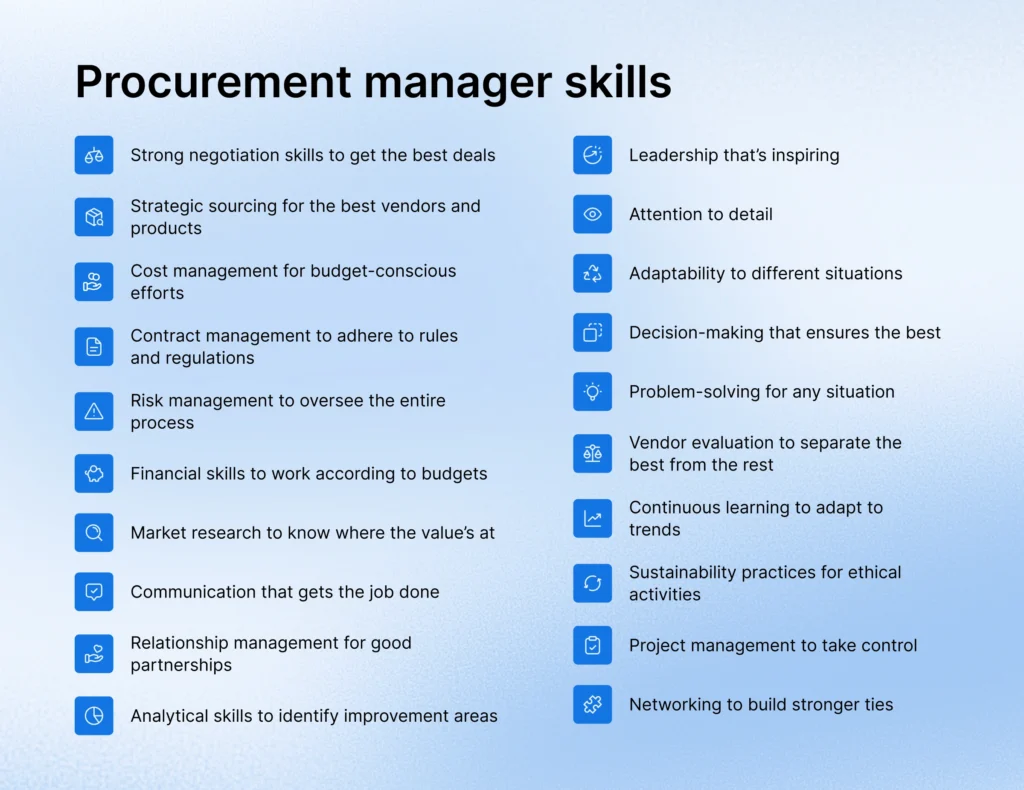
11. Leadership that’s inspiring
Leading teams, mentoring staff, and guiding procurement strategy are essential procurement manager skills. Strong leadership keeps everyone aligned and ensures they work together towards business objectives.
12. Attention to detail
Procurement officers must carefully review contracts, orders, and invoices. This prevents errors in the process and reduces risks. They must pay extra attention to detail when it comes to ensuring compliance with company policies.
13. Adaptability to different situations
Procurement professionals should be open to change and must adjust as the market shifts. This includes adjusting to market conditions, price shifts, and unexpected supply challenges. This will allow them to be more flexible and, hence, make the procurement process more flexible.
14. Decision-making that ensures the best
Managers need to make quick decisions that keep the company’s interests first. In order to do this, they must be well-versed in the process and make data-driven choices that keep procurement operations efficient and ensure the best outcomes for the business.
15. Problem-solving for any situation
Resolving issues like late deliveries, supplier disputes, or quality problems is part of a procurement officer’s job. Having a solution to problems faced by the team and company, and helping execute it well, is what makes them reliable.
16. Vendor evaluation to separate the best from the rest
Evaluating suppliers based on the company’s criteria ensures they meet quality standards, delivery expectations, and align with business goals.
17. Continuous learning to adapt to trends
Managers should keep themselves updated with trends and current happenings in the procurement industry to ensure they’re well-educated with new technologies and best practices, which helps strengthen procurement skills for future procurement challenges.
18. Sustainability practices for ethical activities
Choosing ethical and eco-friendly suppliers helps a company ensure its processes are sustainable and also supports long-term business success. Procurement heads play a role here by using their expertise to differentiate the harmful practices from the desirable ones.
19. Project management to take control
With good project management skills, managers will not only be able to manage multiple projects at once but also coordinate purchases, keep timelines in order, and oversee cross-departmental activities. They ensure that all of these projects are organized and meet deadlines.
20. Networking to build stronger ties
It goes without saying that leaders need to be social. That’s how lasting connections are made. Attending events, building industry contacts, and staying informed enhance procurement officer skills and open new sourcing opportunities.
How to be a good procurement officer: procurement specialist skills you need
Being a good procurement officer takes more than just meeting deadlines on time and being approachable. Those are good qualities, but you need to be very well-equipped to truly excel and shine as an inspirational leader. As a sourcing manager, you need strong skills in negotiation, strategic sourcing, contract management, risk management, and data analysis. These important skills for a procurement specialist help you manage suppliers and ensure cost-effective results.
1. Stay updated with industry trends
It’s a constant learning process for procurement officers. Since rules, laws, and markets are constantly changing, managers must know the current status and trends. Additionally, they should also analyze competitor procurement patterns so that they can advise their team on where to improve and implement new technology and best practices. This allows them to make better choices and stay ahead of problems.
2. Build and improve your leadership skills
A good officer leads by example. If you manage a team, you need to motivate and coach them. A leader is also there for their team when they need guidance and support. Strong procurement skills, like inspirational leadership, give your team someone to look up to, encourage them to perform better, and keep projects a team effort and well on track.
3. Focus on maintaining pleasant supplier relationships
A procurement officer is often assessed on how well they’re able to maintain relationships, both internal and external. Healthy supplier relationships indicate that everything is going well. Managers should pay vendors on time, communicate clearly, and build trust. This ensures better deals and smoother cooperation.
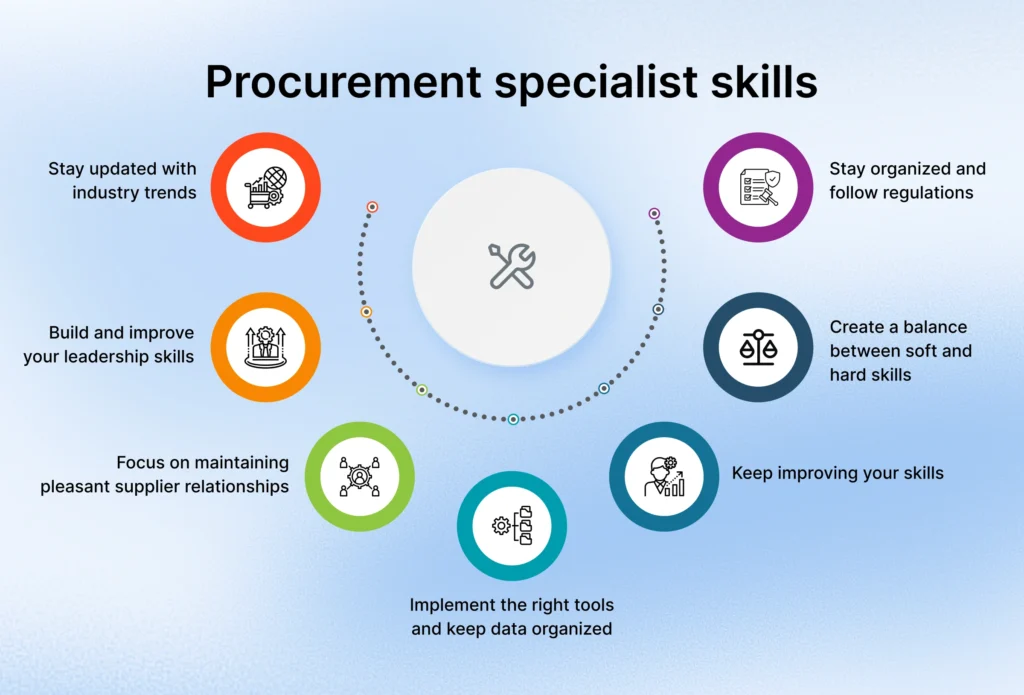
4. Implement the right tools and keep data organized
It’s important for leaders in the procurement processes to be tech-savvy. The smart use of technology makes work faster and easier. Do your research and choose tools that will benefit your team, fit your company’s needs, keep data organized, and connect systems properly. This helps with tracking suppliers and reducing errors.
5. Keep improving your skills
For officers, knowledge truly is the best technique to get work done effectively. Learning should go beyond work hours and turn into skills that will help them in their operations. Earning certifications, improving negotiation and contract skills, and expanding knowledge in finance or risk management add to your growth. These are key procurement skills and responsibilities that make you trustworthy and effective.
6. Create a balance between soft and hard skills
Technical knowledge is very important, but remember to be a people person as well. Having strong communication skills and high empathy are part of what makes you stand out. Communication, teamwork, and relationship-building are soft skills for procurement that matter just as much as analyzing data or managing contracts. A mix of both leads to long-term success.
7. Stay organized and follow regulations
Procurement involves compliance, paperwork, and deadlines. Here, good organization, attention to detail, and knowledge of procurement laws help officers keep processes clean, avoid risks, and save time.
How can you monitor the effectiveness of your procurement skills?
To know if your skills are producing good results, set clear procurement KPIs to measure tangible outcomes, like cost savings, efficient operations, and good supplier relationships. You must also align them with your company’s goals, and use both measurable numbers and feedback from your colleagues and suppliers to track where you’re doing well.
1. Track how much you’re able to save
One of the easiest ways to measure success is by looking at how much money you save the company. You can do this by comparing the current costs with those of previous years to see how much budgeting and cost-effectiveness have improved.
2. Review how your suppliers are performing
Strong supplier relationships are always a good indicator that your skills are being put to good use. Check if your suppliers deliver on time, meet quality standards, and support your business goals. This means your procurement specialist skills are getting the company desirable results and are being put into practice.
3. Measure the procurement cycle time
Look at how long the procurement process takes. This means you need to monitor the time it takes to complete tasks like issuing purchase orders. Shorter cycle times usually mean your processes are efficient and well-managed.
4. Check purchase order accuracy
Small slip-ups in purchase orders may seem easy to recover from, but they can cost time and money. Tracking how accurate and complete your orders are helps improve your daily work as well as overall results.
5. Compare with benchmarks
You shouldn’t only be in competition with yourself. Yes, measuring your performance and seeing improvements is great, but you need to track how you perform compared to industry benchmarks. This helps identify gaps and gives a clear idea of where your procurement manager skills stand in the market.
6. Monitor your progress over time
Look at your own growth by comparing today’s results with past performance. It can be a great source of motivation to keep performing well. Therefore, tracking historical data shows how your procurement skills are developing and highlights areas for improvement.
Conclusion
Mastering procurement skills makes a business succeed. By combining strategy, relationship-building, and careful analysis, procurement officers can help companies in every area of the sourcing process. The right research and strategy can save costs, boost efficiency, and strengthen supplier partnerships. This blog talked about how tracking progress, learning new skills, and balancing soft and hard skills helped not only managers grow, but also helped businesses transform their procurement operations. Sourcing and procurement skills are extremely important in the fast-paced business world, and managers who equip themselves with the right knowledge are likely to lead their companies to success.
Frequently asked questions
What are procurement skills?
Procurement skills are the ability to source, negotiate, and manage suppliers effectively. These skills help organizations save costs, ensure quality, strengthen supplier relationships, and align purchases with overall business goals.
What is a procurement specialist?
A procurement specialist strategically sources and acquires the goods and services that a company requires to perform its daily operations. These employees are responsible for managing supplier relationships, ensuring effective communication, and negotiating the most ideal contracts.
What are the 7 principles of procurement in order?
The seven common procurement principles are as follows:
-
- Accountability
- Fairness
- Integrity
- Transparency
- Competition
- Value for money
- Efficiency.
Together, they help organizations make sustainable, ethical, and cost-effective purchasing decisions.
-
What are the 5 main things in procurement?
The five main things in procurement are the “Five Rights”: right product, right price, right supplier, right quantity, and right time. These ensure efficient, cost-effective, and timely purchasing activities.
What is the skills framework for procurement?
A procurement skills framework comprises the essential knowledge and skills required of professionals. It categorizes skills by levels, from basic tasks to leadership, helping organizations train, evaluate, and develop procurement teams.
What key skills does a procurement professional need?
A procurement professional needs technical skills like sourcing, contract management, and data analysis. These professionals must also have soft skills such as negotiation, communication, and relationship management to ensure value and efficiency.
Why is negotiation such an important skill in procurement?
Negotiation is crucial in procurement as it helps companies secure the best possible deal. This includes the best contract terms, prices, and quality. It helps organizations reduce costs, build strong supplier relationships, and achieve long-term business value.
Which metrics matter most for effective procurement performance?
The key procurement metrics to track include cost savings, vendor performance, compliance, spend under management, cycle time, and total cost of ownership. These numbers measure the effectiveness of these skills, and also give other insights like efficiency, value, team performance, vendor management, and more.
Schedule a Demo
We’d love to hear from you. Please give us a call on +1 315-645-2799.
Explore more from Procol
Discover expert tips, how-to guides, industry insights, and the latest procurement trends.

Procurement orchestration: All you need to know in 2026
Explore the value of procurement orchestration, how it works, its benefits,...
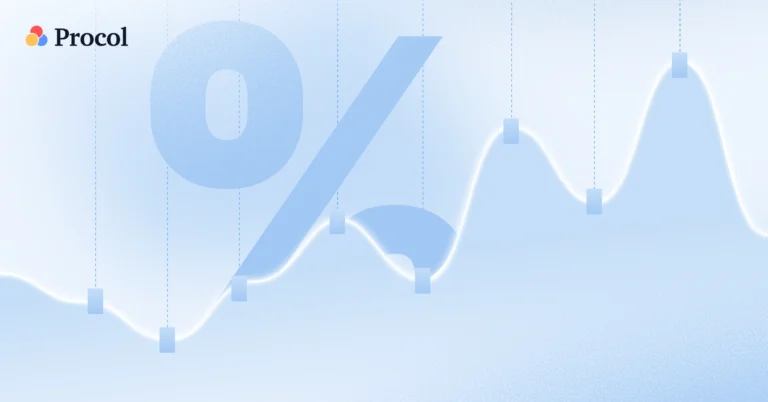
Top 22 spend management KPIs to optimize procurement in 2026
Today’s business world has moved from just ‘buying’ to ‘managing spend’...

What is supplier diversity and why is it important?
In the modern corporate competitive world, where both market resilience and...



